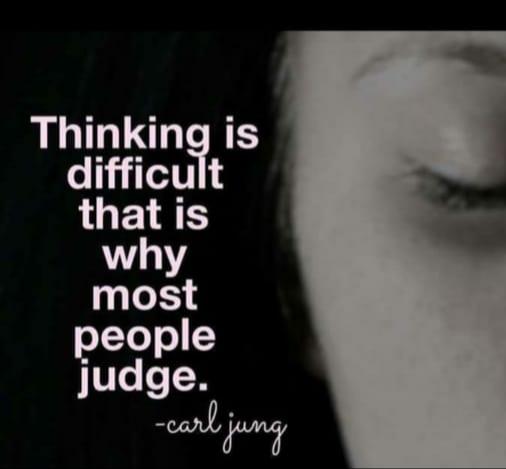Thinking becomes difficult for a number of reasons; the most important one being sheer laziness to exercise the brain muscles. Jumping to conclusions by judging others is relatively simple; interpret the available data to suit ones bias and proffer a theory that often has a negative connotation because it is human to easily believe bad news about others than accept good news about others enthusiastically.
So how do we judge people? There are various styles we adopt which include the following:
Using facts selectively – Since we get information from various sources, it becomes difficult to filter the same. However, it is relatively easy to cull out information, often out of context and pass it on as facts. While many times the intent maybe to showcase our own knowledge, our personal bias can often be the key to what information we cull out and with who we share it.
Never cross checking data – While information that we get can always be cross checked, the effort is too cumbersome and hence we use our judgment to decide if the source is authentic. This judgment of the authenticity of the source is again a personal choice that is influenced by our bias. Over time the source becomes the fount of truth for us and the result is the erroneous conclusions we draw.
Allowing our bias to overcome our rationale – The human race has all sorts of bias. These partly stem from our upbringing, partly from our values and beliefs but large they are shaped by our lopsided thinking. Lopsided thinking is the outcome of lazy thinking, convenient thinking and misplaced confidence in one’s ability to think intelligently. Our bias often clouds our judgment but then we are too blind to our own faults and therefore jump to conclusions that vindicate our bias.
Leaking / sharing unsubstantiated information – Subconsciously we need to fulfill an urge to be first. This is best done by trying to share information that we believe is privileged, important and definitive and something that will fulfill our urge to be first. Rumors are a classic case of unsubstantiated information doing the rounds at supersonic speed.
Being inattentive and or indifferent to logic and reason – It is possible that at various times one gets inputs that are contrarian/ unique / rationale but since we are fixated with our own rationale one refuses to consider these. We miss out on the opportunity to think again and instead end up labeling those differing with us stero types indicating they are biased and / or irresponsible.
Each of us is guilty of these. A good example is our own response to any form of criticism be it by parents, teachers, colleagues, friends, peers, spouse, children or even bosses at the work place. Our initial response is a good indicator of our bias which emits from our judgment of those giving us a feedback.
Try these:
- List out the top 5 criticism that you have received from your close family, friends, colleagues and bosses. Also list out 2 qualities of yours that you are appreciated for. What is your opinion about the feedback you have received? How fair is it? How many are judging you unfairly?
- Choose one relative, one friend, one colleague and one individual you do not like very much. Write down their names and against each name jot down 2 criticisms you have for them and 2 appreciative qualities in them.
- If you were your own boss at work what kind of feedback would you give to yourself? List out at least 7 points that you would share.
This post is courtesy www.actspot.com
You are also invited to visit our Inspirational and Motivational Blog






